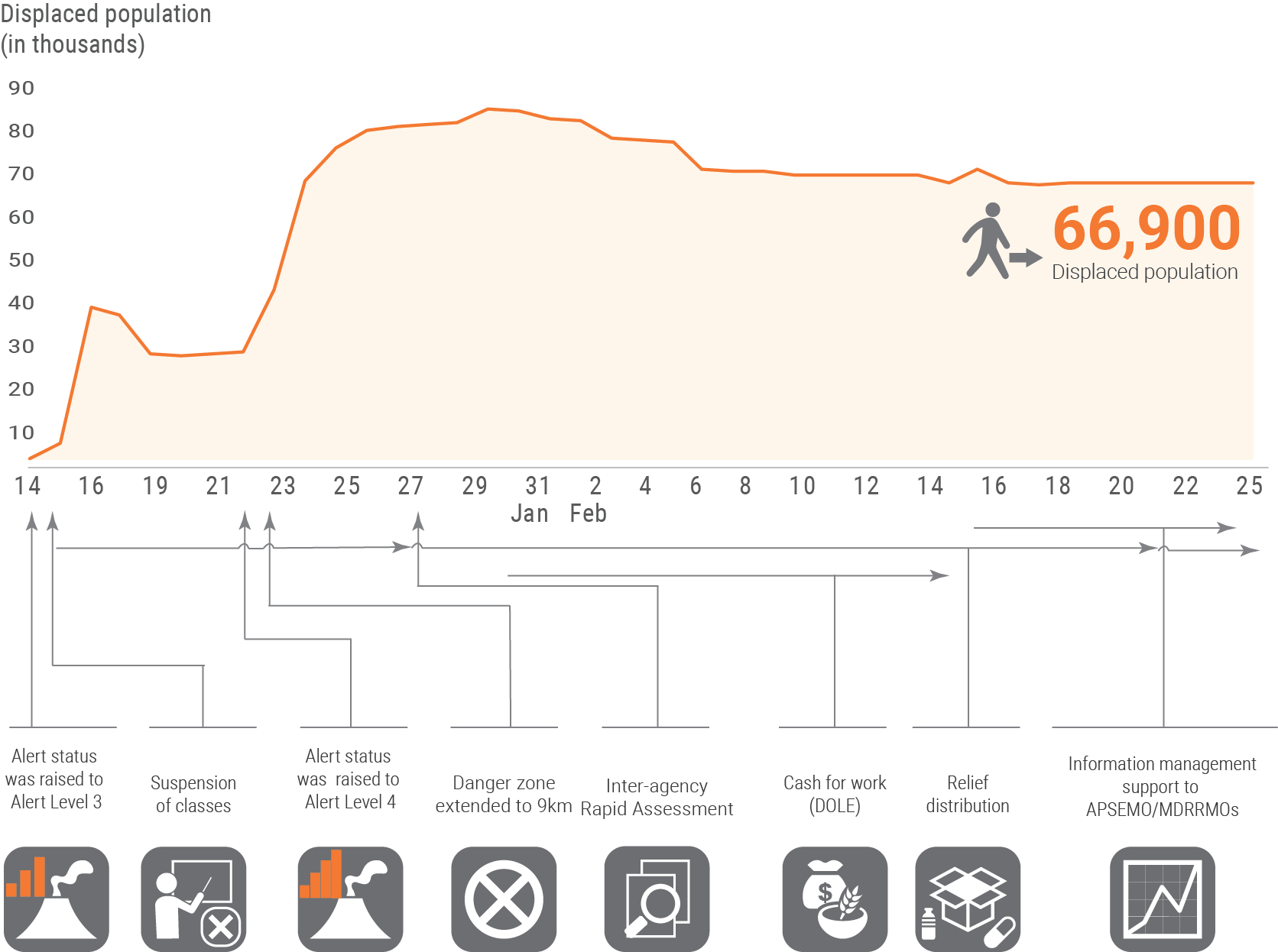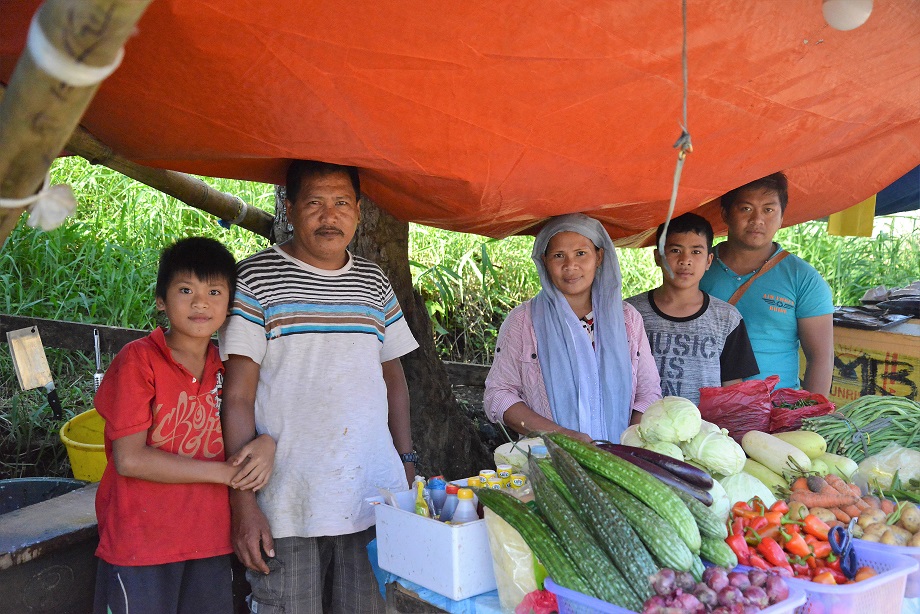
Marawi humanitarian needs continue for returnees and displaced
In Barangay Guimba, Marawi City, Jamaliah Disa and her husband, Tala, tend to their vegetable garden and feed the chickens. Their two daughters, age nine and one, are inside their concrete two-storey home. On the first floor is a cooperative-run grocery. Nine months ago, violence in Marawi City forced them to leave behind their home and livelihood.
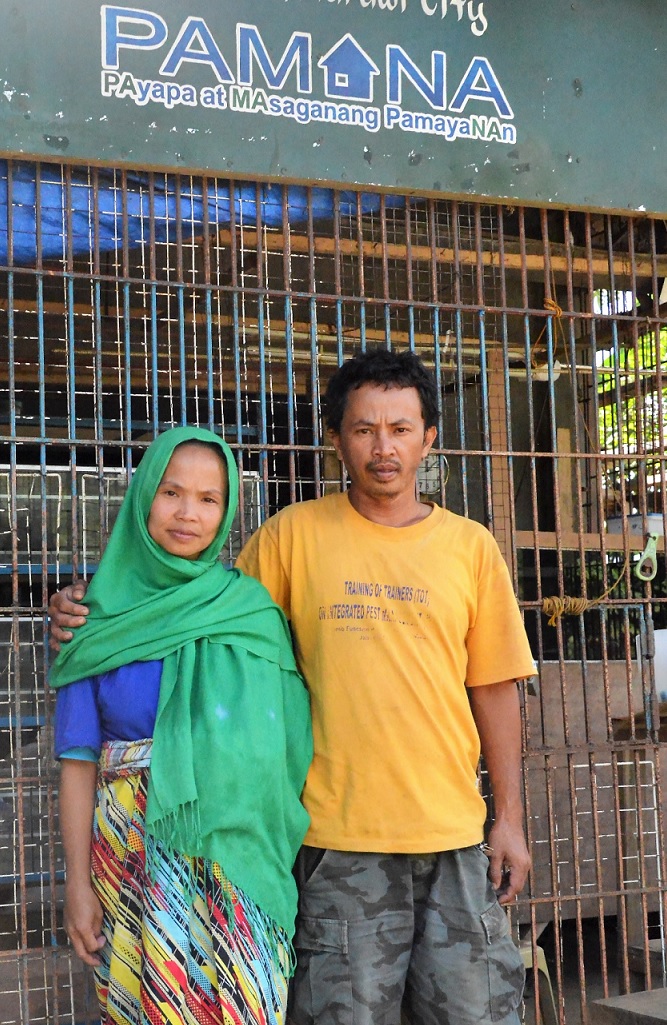
Credit: OCHA/R. Maquilan Barangay Guimba, Marawi City (4 February 2018) - Jamaliah and Tala Disa in front of their community's cooperative grocery. They returned home in December to find that it had been looted during the conflict.
The Disa family flees to safety
When the fighting began in May, Jamaliah Disa and her husband Tala fled their home to Balo-i, Lanao del Norte. They stayed with relatives at first, later renting a place near the evacuation centre. “My heart bled when I would see food being distributed at the evacuation centre. We weren’t able to receive food assistance at first. We were told it was for those in evacuation centres,” said Jamaliah. She remembers having almost nothing to eat. During their hardship while displaced, Tala’s mother died. The memory of being helpless is very painful for the family. “We used to live peacefully and earn up to PHP1,000 (US$19) a day before the conflict,” recalls Jamaliah. “We were able to provide for the needs of the family, especially our girls,” Tala said. The couple helps run the cooperative grocery store on the first floor of their home, which was started in 2012 with 33 members.
According to the couple, being home-based was more difficult than being in an evacuation centre. They felt that less assistance and information reached them. Displacement also placed a strain on marriages, they observed. “We were lucky to hold on to our marriage amidst the trials we faced and continue to face,” the couple shared.
Their journey back to Marawi City
News that they could return home filled them with happiness. On 9 December, they came home to their village to find that their home was destroyed. The grocery store was looted of over P750,000 ($14,500) worth of goods. They also discovered a bomb inside the house.
The couple are now trying to rebuild and recover years of hard work lost by the conflict. They are waiting to see their first harvest from the vegetable garden. The vegetable seeds and poultry were assistance of the government and humanitarian agencies. “We hope that food distribution continues. I am hopeful that we will rise again with the support of the Government and other agencies. We need help with our livelihood to help restart our lives.”
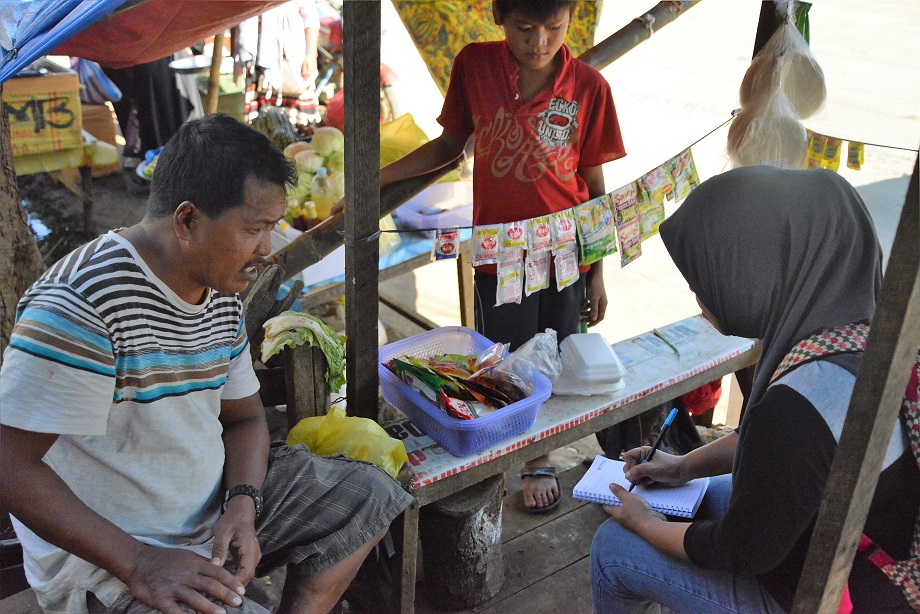
Credit: OCHA/R. Maquilan East Basak, Marawi City (4 February 2018) - Acmad tells his story by their fish and vegetable stall on the roadside as his son looks on.
A family returns to East Basak
Acmad Tabuacar, age 45, sells fish along the road in East Basak while his wife Mylene sells vegetables beside him. The family of six returned to Marawi in November 2017 as part of the first cluster of barangays cleared for return. “I was a businessman used to earning about P1,800 ($35) a day. I also owned a vulcanizing shop. Now, I am in debt with a loan to start selling fish.” Acmad said. He pays his creditor on a weekly basis including interest.
His family fled during the conflict in May and sought refuge at an evacuation centre in Maigo, Lanao del Norte. They slept on cardboard when they arrived, and eventually they received food and other relief items. “We were happy to receive sleeping mats and blankets, as well as health assistance. When our child was admitted to the local hospital, our bill was paid for,” He recalls that staying in an evacuation centre was difficult particularly for his wife and children. However, they didn't have a choice. “I cannot compare anything to the experience of being displaced. As a father I wanted to be able to provide for my family. It pained me to see them suffer so much.” said Acmad.
Cash assistance and livelihood support is needed for families like Acmad to regain their independence. “If I could receive a grant to restart my small business, I would be grateful. It is difficult to pay off old loans with high interests. I used my house as collateral to pay the loan and if I don’t pay, I will lose it.”
Displaced and returnees need continued humanitarian assistance
The Disa and Tabuacar families are among the few who have been able to return to their own homes. However with 24 barangays located in the most affected areas of Marawi City completely destroyed, as many as 60,000 of the city's residents are unable to return. The gradual restoration of utilities, services, schools and livelihood opportunties have left the displaced hesitant to return, and returnees struggling with resuming their daily lives.
The Humanitarian Country Team, composed of UN agencies, international and national NGOs, continues to support government efforts to restore Marawi City as well as assist the over 311,000 persons who continue to be displaced and unable to return home. There remains to be urgent humanitarian needs for the people of Marawi City, especially with food security, protection and livelihood support.
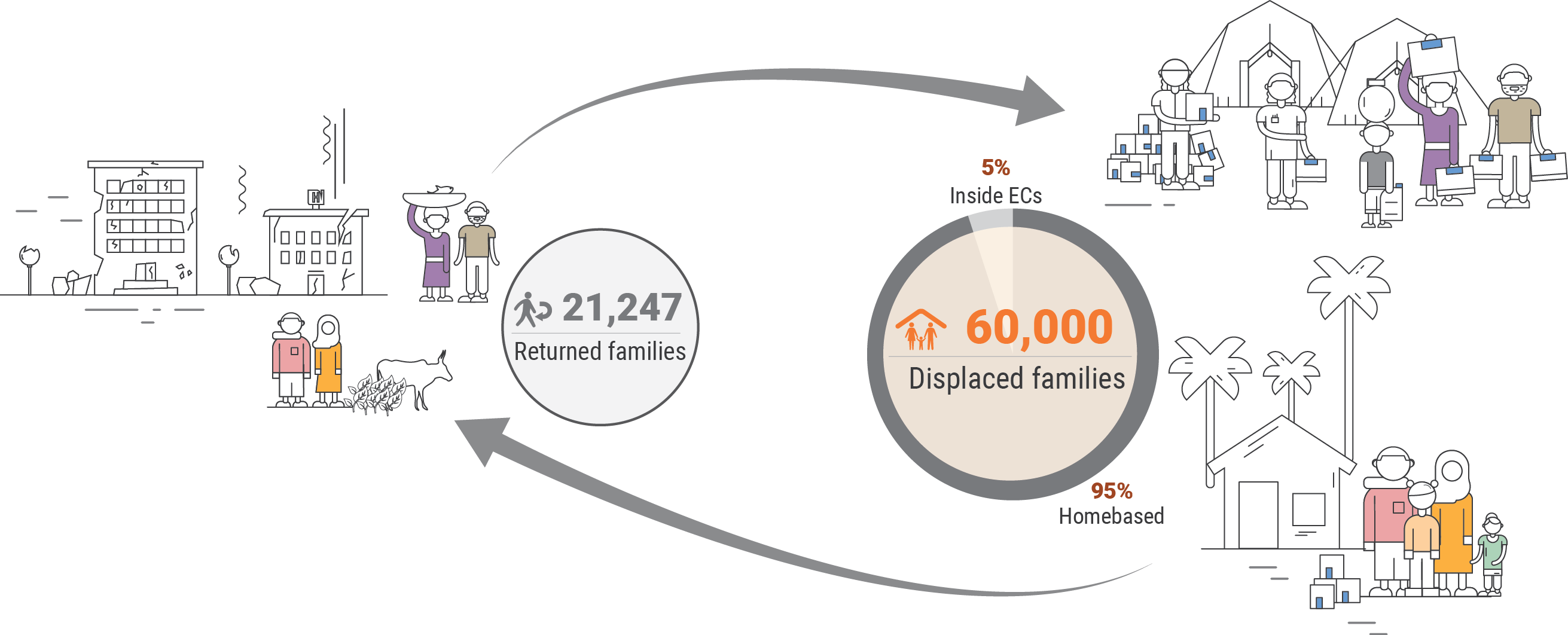
The Cycle of Displacement and Return: Marawi Conflict Snapshot
Source: OCHA
"I cannot compare anything to the experience of being displaced. As a father I wanted to be able provide for my family." - Acmad Tabuacar of Marawi City
Albay communities displaced indefinitely as Mayon Volcano continues to erupt
Mayon Volcano located in Legazpi City, Albay remains active, with alert-level 4 still in place since 22 January. As of 25 February, more than 61,000 people are staying in evacuation centres, while 5,621 are being hosted by family and friends. The provincial and municipal authorities continue to lead disaster response, augmented by the national government, Red Cross, and humanitarian partners. Their coordinated efforts have risen to the challenge of an unpredictable disaster and the frustrations of an indefinite evacuation for families from within the 6-7 km danger zone of the volcano.
The protracted displacement has affected the livelihoods of farmers and workers at a quarry that shut down due to the eruption. Food assistance, continuity of livelihood, and protection have been identified as priority needs. Women and children are among the most vulnerable in displacement. The United Nations Population Fund (UNFPA) estimates that as of 20 February, there are as many as 2,500 pregnant women among the affected population, with close to 800 expected to deliver in the next three months. The Department of Health Regional Office V data indicates that there are over 1,700 lactating mothers staying in evacuation centres. The National Disaster Risk Reduction and Management Council reports that as of 21 February, 65 schools and over 72,000 people within the 6-7 km radius danger zone are affected. Even if the alert level is lowered to level-3, is it estimated that over 30,000 people will remain displaced.
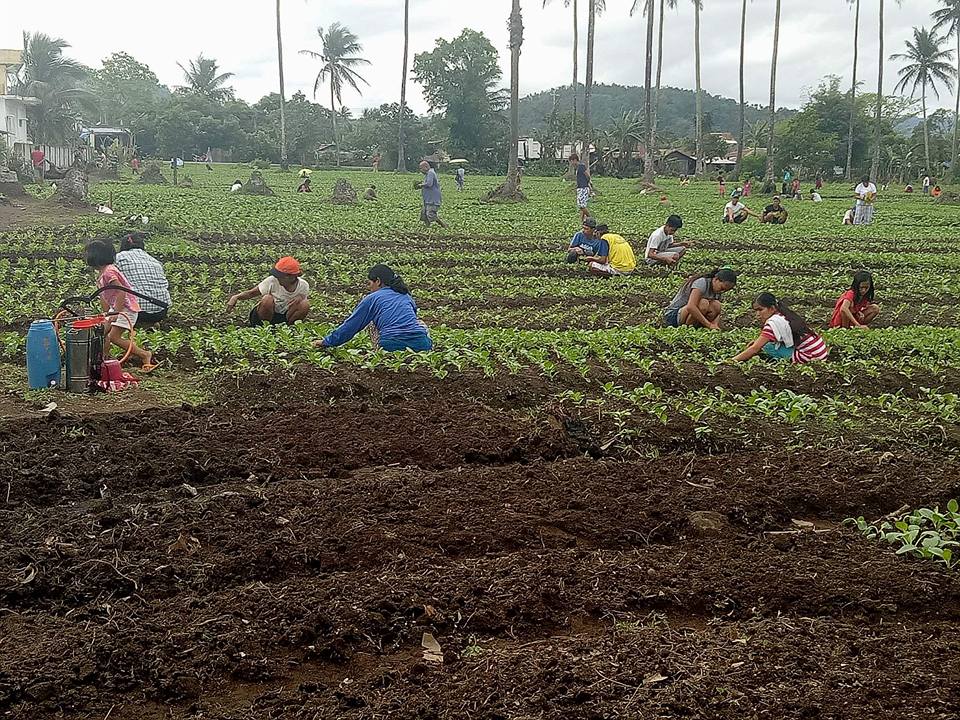
Impact on Albay agriculture and livelihoods
Crops and livestock of Albay farmers are severely affected by the volcano's ashfall. The Food and Agriculture Organization of the United Nations (FAO) reports that the current situation is expected to lead to farmers missing out on the upcoming harvest season of rice, corn, vegetables and abaca crops. Livestock such as carabao and cattle help in preparing farmlands and hauling farm produce, and their loss will severely affect overall incomes of farmers, reports FAO. According to the Department of Agriculture, more than 10,100 head of livestock in 42 barangays are affected by the Mayon Volcano eruption. There have been reports of farmers returning to the danger zones to tend to their farms and bring their animals to graze, risking their lives.
Government response and humanitarian action
A coordinated assessment in January between the Albay Public Safety and Emergency Management Office (APSEMO) and the Humanitarian Country Team, composed of UN agencies, international and national non-governmental organizations, and the Red Cross raised the need for decongesting crowded evacuated centres and improving sanitation facilities. As of 25 February, the number of those displaced in evacuation centres have dropped by close to 20,000 people, with local authorities allowing those who live beyond the 8 km radius danger zone to return to their homes.
FAO reports that the Department of Agriculture Regional Office V has been assisting farmers and conducting livelihood training in February on vegetable production for 500 affected farmers in 10 municipalities. Each farmer was also given planting supplies such as fertilizer and mulch. Local authorities have designated farming areas near evacuation centres for short-season vegetables, to be consumed by evacuees. Thirteen per cent of livestock were reportedly evacuated to pooling stations in Albay. FAO plans to support animal husbandry training to capacitate farming households on the production of feeds which will be provided to the livestock in evacuation centres.
The Department of Social Welfare and Development (DSWD) initiated a cash-for-work programme, allocating P72 million ($1.4 million). A cash-for-work beneficiary will receive P290 ($5) per day for 10 days. The work will be based on the needs of the evacuation centre where they are staying. UNFPA is working together with the Department of Health to install women-and-child friendly spaces and maternity tents. On 27 February, DSWD with support from the World Food Programme and Philippine Disaster Resiliency Foundation sent a fleet of trucks with 36,100 food packs and relief items to Guinobatan, Albay for distribution to affected communities.
On 5 February, the International Labour Organization of the United Nations (ILO) provided personal protective equipment and tools to support government response to clean shelters and restore facilities, while ensuring safety and health of workers under the government’s emergency employment and cash-for-work programmes.
As part of the request of APSEMO for information management support, OCHA has been assisting in data management, including gathering data from municipal governments. The Humanitarian Country Team continues to monitor the situation and support government efforts to assist those displaced by the volcano eruption.
Mayon Volcano Eruption: A Timeline of Humanitarian Response
Source: OCHAFood assistance, continuity of livelihood, and protection have been identified as priority needs for Albay communities.
The Department of Agriculture Regional Office V has been assisting farmers and conducting livelihood training in February on vegetable production for 500 affected farmers in 10 municipalities.
Philippine delegation participates in Humanitarian Partnerships Networking Week
The fourth Humanitarian Networks and Partnerships Week (HNPW) was held in Geneva 5-9 February to identify best practices and innovative solutions, while fostering effective collaboration towards a more coherent and coordinated response to some 136 million people across the globe currently needing humanitarian assistance and protection. The week-long event, hosted by the Swiss Government and co-chaired by the UK Department for International Development and the UN Office for the Coordination of Humanitarian Affairs, convened the annual meetings of more than 30 networks and partnerships such as the International Search and Rescue Advisory Group (INSARAG), Connecting Business Initiative, Civil-Military Coordination, Emergency Medical Teams, and Emergency Supply Pre-Positioning Strategies.
Philippine Government and private sector participation
The Government of the Philippines played an active part in the proceedings, with a delegation led by the deputy administrator of the Office for Civil Defense, Assistant Secretary Kristoffer James Purisima, and included senior representatives of the Armed Forces and the Philippine Mission in Geneva. The Philippines Disaster Resilience Foundation (PDRF), through its president Mr. Butch Meilly, represented the private sector.
In separate bilateral meetings with OCHA Assistant Secretary-General Ursula Mueller and OCHA Geneva head Mr. Rudolf Müller, the Philippine delegation expressed its appreciation for the longestablished relationship with OCHA. The delegation highlighted efforts to build local and national capacity for urban search and rescue which is supported by INSARAG members Australia and Japan. An invitation was extended to Assistant Secretary-General Mueller to attend the INSARAG Asia- Pacific regional earthquake response exercise, which will be in Clark, Pampanga in June 2018.
ASG Mueller acknowledged the continuing engagement of the Philippines, and assured the support and cooperation of OCHA in assisting the Government in their preparedness and response planning. Both sides agreed to work for closer collaboration in finding innovative approaches for preparedness and response policies and in strengthening national capacities.
Emphasizing the importance of multi-stakeholder initiatives, OCHA’s private sector engagement strategy focuses on fostering links between the humanitarian community and business networks. PDRF shared its initiatives in the Philippines and showcased the dynamism of the business sector and humanitarian community collaborating in disaster risk reduction, emergency preparedness, response and recovery.
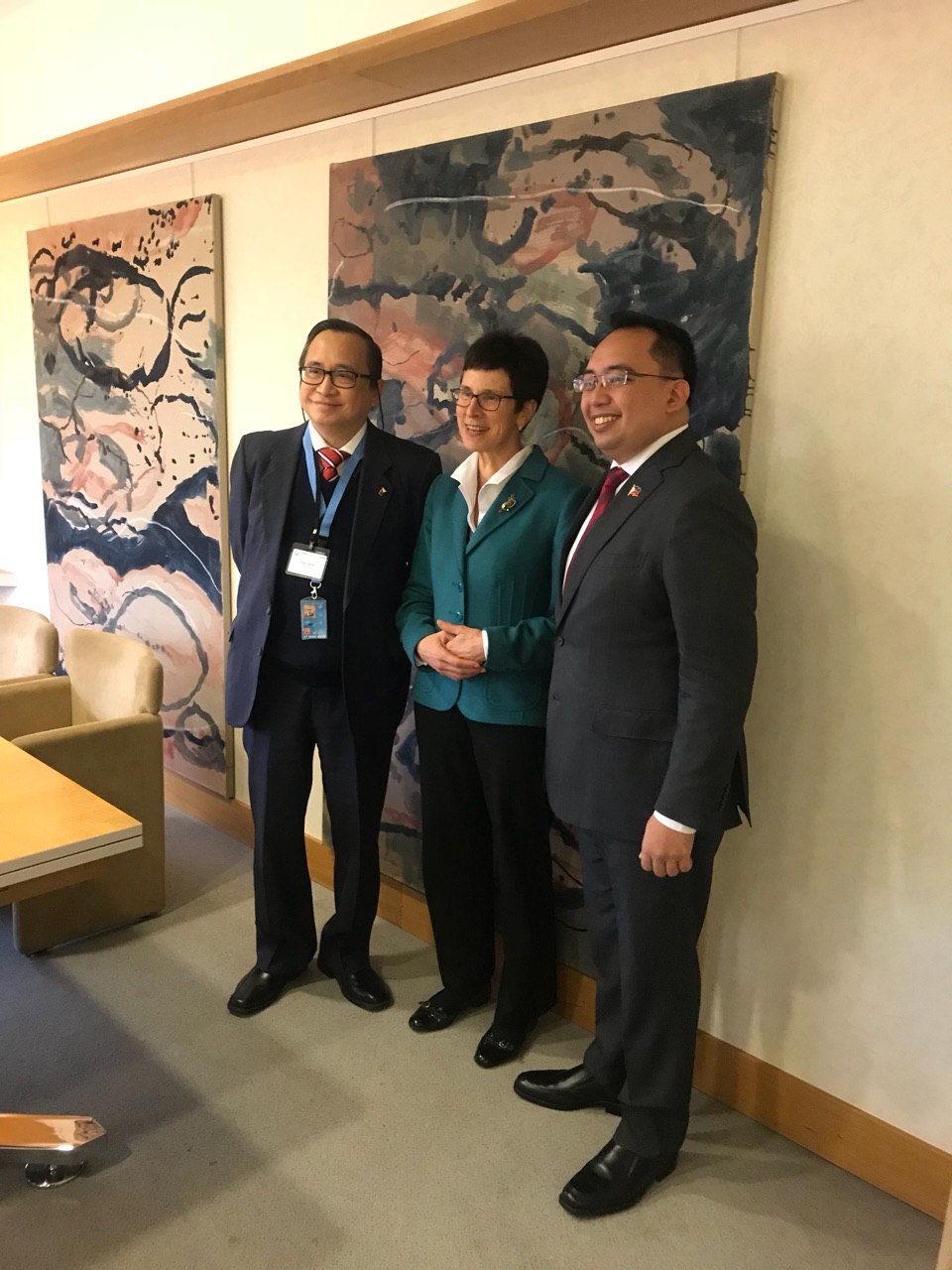
The Government of the Philippines played an active part in the proceedings, with a delegation led by the deputy administrator of the Office for Civil Defense, Assistant Secretary Kristoffer James Purisima, and including senior representatives of the Armed Forces and the Philippine Mission in Geneva.
